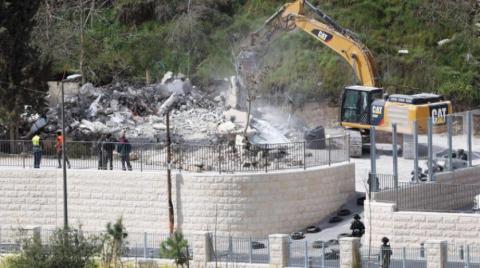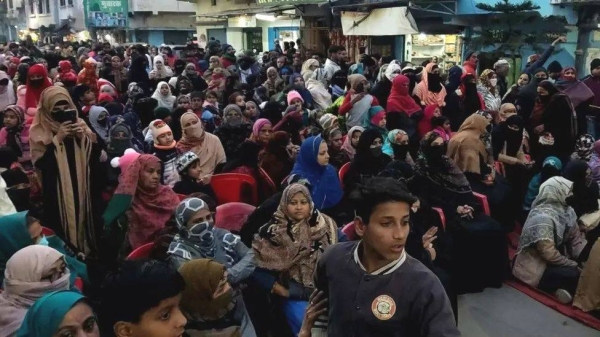
Israel’s supreme court is due to make a decision on whether to evict Palestinian families from the East Jerusalem neighbourhood of Sheikh Jarrah, in a final hearing in the controversial case that helped spark communal violence inside Israel and a new war with Hamas earlier this year.
A verdict in the deeply contentious case, which could lead to the neighbourhood’s current residents being forcibly displaced to make way for Jewish settlers in a decades-old dispute, is expected on Monday morning.
The ruling was delayed in May, when the state attorney general made a last-minute request for more time to study the case. But by then anger over the planned evictions had led to some of Jerusalem’s worst unrest in years, in which hundreds of Palestinians were wounded in confrontations with the police.
The Sheikh Jarrah protests coincided with a decision to ban traditional Ramadan gatherings at Jerusalem’s holy sites and marches and riots by far-right Jewish groups, in violence that spiralled into an 11-day confrontation with Hamas in the Gaza strip, which killed 254 Palestinians and 13 people in Israel.
The Times of Israel reported that the Israeli government was seeking to postpone the hearing for another six months in order to diffuse tensions and appease Joe Biden’s administration, which opposes the evictions. The new prime minister, Naftali Bennett, is expected to make his first state visit to Washington DC later in August.
Several Israeli media outlets have also reported that if the court refuses to hear the Palestinians’ petition for appeal, it is unlikely to order the state to carry out the evictions or issue a deadline, and that Bennett’s government could avoid conflict by citing a 1991 attorney general decision that police may decline to implement evictions if there was danger in doing so.
Nonetheless, the case is being watched nervously by communities across the city still reeling from the violence earlier this year. Since May’s clashes, Sheikh Jarrah has been under a police blockade, which residents say amounts to a siege.
“It’s an ongoing nightmare for the families in Sheikh Jarrah: they inherited these problems from their fathers and grandfathers,” said Sami Ershid, a lawyer who has represented the affected Palestinians for the last 15 years.
“From the very beginning they are seen as second-class citizens in a system of comprehensive discrimination. The first step to justice is reopening the issue of the property ownership and we remain hopeful the court will give us space to discuss all of these difficult issues.”
Sheikh Jarrah, named after a doctor who treated Saladin, the Muslim leader who drove the Crusaders out of Jerusalem in the 12th century, is a wealthy East Jerusalem neighbourhood 500 metres (550 yards) north of the Damascus Gate. Israel seized the Old City, along with East Jerusalem and the West Bank, in 1967.
The area is mostly home to Palestinians, but Israeli settlers have moved into some of its properties, saying they were owned by Jews before the war of 1948.
In a decision criticised by rights groups as “a cynical attempt to evade responsibility”, Israel’s attorney general, Avichai Mandelblit, said in June he would not intervene in the Sheikh Jarrah issue. Israeli media reported his office had come to the conclusion that there were no legal means to prevent the evictions.
Ershid and his partner have submitted a new legal opinion that suggests the current residents of Sheikh Jarrah have full property rights to their homes because the Jordanian government granted ownership and began registering the properties before the process was interrupted in the 1967 war.
Lower courts, however, have upheld claims that the properties are owned by the Israeli Nahalat Shimon company.












